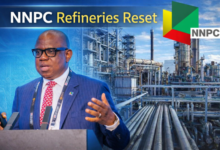Abia Secures $125m Islamic Bank Loan to Drive Infrastructure and Economic Growth

Abia State’s infrastructure overhaul has gained a major boost with the Federal Executive Council’s approval of a $125 million financing facility from the Islamic Development Bank (IsDB). The loan forms a critical part of a $263.8 million Integrated Infrastructure Development Project that aims to modernise urban transport corridors, curb erosion, and stimulate economic activity across the state.
According to Ukoha Njoku, Chief Press Secretary to Governor Alex Otti, the IsDB facility is pivotal to the multi-lender co-financing structure, which also includes $100 million from the African Development Bank (AfDB), $15 million from the Canada–Africa Development Bank, and $23.8 million in counterpart funding from the Abia State Government.
Why This Loan Matters
In development finance terms, the IsDB’s participation is the keystone facility—without its execution, the integrated funding arrangement could stall. The AfDB and Canada–Africa Development Bank agreements are already signed, making the IsDB deal the final piece needed to unlock the entire project pipeline.
The funds will support the construction of 126 kilometres of roads in Aba and 35.57 kilometres in Umuahia, including a strategic link road between both cities and critical erosion control works.
From a financial perspective, the multi-sourced structure spreads risk, leverages concessional lending terms, and allows Abia to undertake large-scale infrastructure without overburdening its fiscal position in the short term.
Economic and Social Impact
Governor Otti’s administration projects far-reaching economic benefits:
- 3,000+ Jobs – Direct employment for engineers, artisans, contractors, and local suppliers.
- Urban Productivity Gains – Reduced travel time in high-density corridors, boosting efficiency for businesses and commuters.
- Climate & Resilience Benefits – Erosion control measures and reduced greenhouse gas emissions.
- Private Sector Catalysis – Upgraded transport infrastructure improves investor confidence and property values.
Njoku stressed that the initiative would improve access to markets, schools, healthcare, and social services while creating a platform for sustained private sector investment.
Governance and Execution Structure
The project will be executed through the Abia State Ministry of Works, under the supervision of a State Steering Committee that will set policy direction for the State Project Implementation Unit.
The IsDB-financed components—including civil works and consultancy—will adhere strictly to IsDB procurement standards, with disbursements made directly to contractors and consultants to ensure transparency and minimise leakage.
For analysts, this direct disbursement approach is a safeguard that enhances fiscal discipline—one of the chronic weaknesses in Nigerian subnational project execution.
Strategic Alignment with Abia’s Growth Agenda
Since taking office, Governor Otti has made transport network modernisation, urban renewal, and sustainable development central to his economic vision. This loan accelerates that agenda, positioning Abia to become a regional commercial hub with a fully integrated road system.
Otti extended his appreciation to President Bola Tinubu, the National Assembly, Finance Minister Wale Edun, and other high-level stakeholders—including IsDB Vice President Dr. Mansur Muhktar—for their roles in securing the facility.
“This project lays the groundwork for a modern, sustainable transport network that will drive commerce, improve quality of life, and enhance Abia’s competitiveness,” Otti affirmed.
Banking & Finance Perspective
From a capital markets and infrastructure finance standpoint, Abia’s model is notable for:
- Blended Finance Approach – Combining multilateral, bilateral, and domestic funding streams to unlock large-scale projects.
- Concessional Lending Terms – Islamic finance structures often carry lower interest costs and flexible repayment schedules, reducing debt servicing pressure.
- Integrated Development Linkages – The project’s road, erosion control, and urban renewal components are mutually reinforcing, ensuring economic spillover effects.
If executed effectively, this project could serve as a template for other Nigerian states seeking to leverage multi-partner financing for transformational infrastructure without destabilising public finances.
Bottom line:
Abia’s $125 million IsDB loan is more than just a funding milestone—it is a strategic lever for economic restructuring. By combining sustainable financing with a clear development vision, the state is setting itself on a path to stronger competitiveness, improved urban mobility, and long-term investor appeal.












